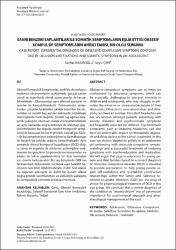Sanrı benzeri saplantılar ile somatik semptomların eşlik ettiği obsesif kompulsif semptomların ayırıcı tanısı, bir olgu sunumu
Abstract
Obsessive-compulsive symptoms can at times be
confounded by delusional symptoms, which can
be especially challenging to interpret correctly in
children and adolescents, who may struggle to articulate
the intrusive or unreasonable nature of their
obsessions. Obsessions, overvalued ideas and delusions
can have an overlap. Persistent headaches are
not uncommon amongst patients presenting with
anxiety disorders and psychosomatic symptoms
are frequently reported by children. Psychosomatic
complaints, such as enduring headaches, can also
have an undesirable impact on therapeutic approach
and delay access to the correct treatment. In this
case we discuss diagnostic pitfalls in an adolescent
girl presenting with obsessive-compulsive symptomatology
and a successful treatment of enduring
symptoms with psycho-education and medication.
We will argue that psycho-education for young people
and their families based on a correct diagnosis
of obsessive compulsive disorder (OCD) is essential
to provide reassurance, to help young people regain
self-confidence and re-establish constructive
relationships within the family unit. Selective serotonin
re-uptake inhibitors (SSRI) are the drug of
choice for pharmacological treatment of OCD in this
age group. We conclude that a correct diagnosis of
the condition as "anxiety-driven" was of paramount
importance for psychological approach and pharmacological
management of this case. Obsesif Kompulsif Semptomlar, özellikle de zorlayıcı
nedensiz obsesyonlarını açıklamada güçlük çeken
çocuk ve ergenlerde olmak üzere sanrılar ile karışabilmektedir.
Obsesyonlar, aşırı zihinsel uğraşlar ve
sanrılar ile karışabilmektedir. Psikosomatik semptomlar
çocuklar tarafından sıklıkla belirtilen bir durumdur
ve sürekli baş ağrıları anksiyete bozukluğu
olan kişilerde nadir değildir. Sürekli baş ağrıları terapotik
yaklaşımı olumsuz olarak etkileyebilmektedir
ve aynı zamanda doğru tedaviye de ulaşmayı güçleştirmektedir.
Bu olguda obsesif kompulsif semptoloji
ile başvuran bir kız ergendeki tanısal güçlükleri
ile bu semptomların psikoeğitim ve farmakoterapi
ile başarılı bir şekilde tedavisi tartışılmaktadır. Aynı
zamanda obsesif kompulsif bozukluğun (OCD) doğru
tanısı ile ergenler ile ailelerine psikoeğitim verilmesinin
bu gençlerin öz güvenlerine kavuşmaları ve
aileleri ile tekrar yapılandırılmış bir ilişki kurmaları
için önemi tartışılacaktır. Bu yaş bireylerde OKB’nin
farmakolojik tedavisinde seçilecek ajan Selektif Serotonin
Geri Alım İnhibitöreleridir (SSRI). Son olarak
bu olgunun anksiyete ile ilişkili bir durum olarak
doğru şekilde tanımlanması ve psikolojik yaklaşımı
ile farmakolojik yönetimi oldukça önemlidir.
Source
Afyon Kocatepe Üniversitesi, Kocatepe Tıp DergisiVolume
18Issue
4URI
http://kocatepetipdergisi.aku.edu.tr/wp-content/uploads/2017/12/6-Serhat-NASIROG%CC%86LU.pdfhttp://hdl.handle.net/11630/4920
Collections
- Kocatepe Tıp Dergisi [154]



















